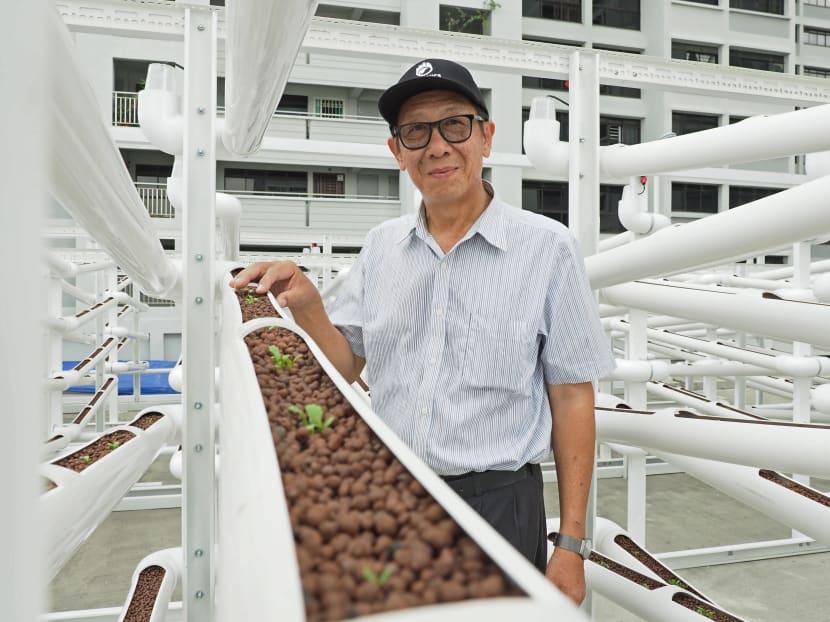Rooftop car-park greens on the menu, as Singapore innovates to grow agri-tech sector
SINGAPORE — It took Mr Teo Hwa Kok seven years of research before his urban farm in Ang Mo Kio finally bore fruit.

Mr Teo Hwa Kok, founder of Citiponics Farm, converted unused and unconventional spaces such as the rooftop of a multi-storey car park in Ang Mo Kio into an urban vertical farm that grows vegetables without soil.
SINGAPORE — It took Mr Teo Hwa Kok seven years of research before his urban farm in Ang Mo Kio finally bore fruit.
In April, the first batch of Mr Teo’s Georgina lettuce will go on sale. The vegetables are grown and harvested in the Citiponics farm, which was co-founded by the 56-year-old and is located at the roof of a Housing and Development Board (HDB) car park.
Using a technology called the Aqua Organic System, the farm produces vegetables that are free of pesticides, and its water- and energy-saving methods prevent mosquito breeding, Mr Teo said.
A water tank pumps water into its system of 400 racks — pipes filled with customised pebbles where the seeds are planted — before it flows back into the tank and is recycled within the system.
Read also
"It’s just like our heart, it keeps on pumping the blood and then goes through all these arteries and comes back,” said Mr Teo.
With the first batch of seeds planted in February, Mr Teo expects to harvest the lettuce next month and sell his Citiponics produce at the FairPrice supermarket at Ang Mo Kio Hub.
After plowing in years of research, Mr Teo had initially set up a prototype farm in Taman Jurong in 2016 before starting his first commercial urban farm in Ang Mo Kio in December last year.
Mr Teo said that the authorities had allowed him to use the rooftop space at the car park as the HDB and the Agri-Food & Veterinary Authority of Singapore (AVA) saw how he could expand production by making use of unused or under-utilised spaces.
Dr Koh Poh Koon, Senior Minister of State for Trade and Industry, noted that the urban farm is one example of how government agencies can “explore regulatory flexibility and innovative ways of doing things” to grow an agri-technology sector which is still at a nascent stage in Singapore.
Read also
“Our vision is for Singapore to be a leading urban agriculture and aquaculture technology hub with a food production model that can be exported to the region,” said Dr Koh, who was speaking at the parliamentary debate on the Ministry of Trade and Industry's budget on Monday (March 3).
Besides regulatory flexibility, Dr Koh also laid out other measures to help grow the agri-tech sector, which he said could become an export industry for Singapore.
A new 18ha Agri-Food Innovation Park (Afip) will be established in Sungei Kadut, and its first phase will be ready from the second quarter of 2021, with potential for future expansion.
“Afip will bring together high-tech farming and R&D (research and development) activities, including indoor plant factories, insect farms and animal feed production facilities,” he added.
Dr Koh will also be leading a multi-agency team to see how the Government can better support the agri-tech industry as one of the new growth areas of Singapore.
Read also
Educational institutions are equipping students with the necessary skills needed for this industry, said Dr Koh. For example, Republic Polytechnic launched a Diploma in Urban Agricultural Technology earlier this year. Temasek Polytechnic will set up a Centre of Innovation in Aquaculture, said Finance Minister Heng Swee Keat in his Budget statement last month.
Dr Koh said: “Our position as an agri-tech hub will strengthen Singapore’s economy, create good jobs for Singaporeans, and buttress Singapore’s food security.”
He also said that the food and agri-tech sector is a US$5 trillion (S$6.8 trillion) global industry that is growing rapidly due to new innovations in processes and products.








